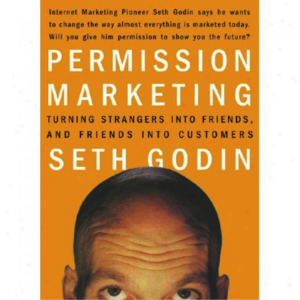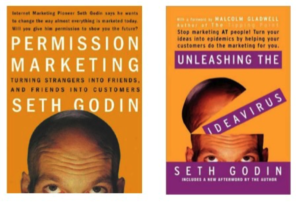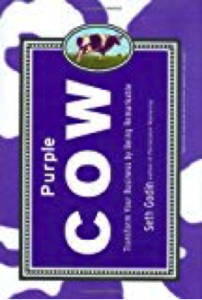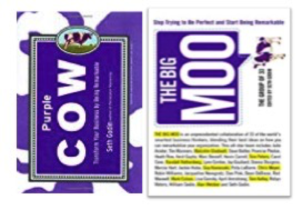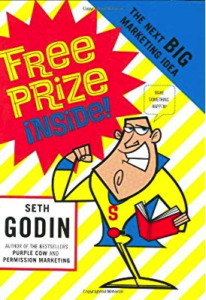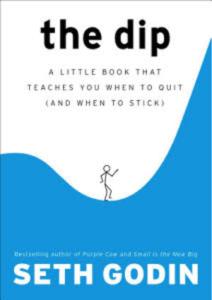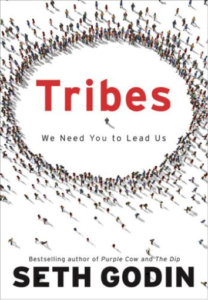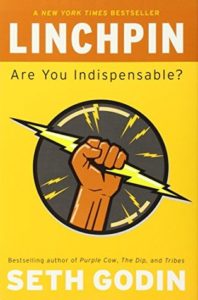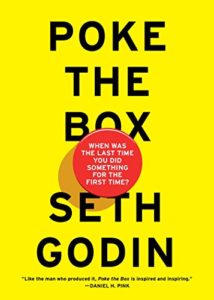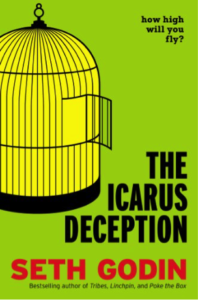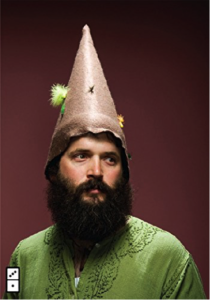In the summer, we began a tour of the best of Seth Godin’s books. When we started, I dubbed this “the summer of Seth Godin.” That was 22 lessons ago. It took longer than I thought. As we moved into Autumn, I thought about “the fall of Seth Godin,” but that sounded wrong and “the winter of Seth Godin” just sounded creepy. So I left additional labels alone.
Here is a review of the books we discussed complete with hyperlinks to Amazon should any of them grab your interest:
Permission Marketing: This was Godin’s first book that that really captured the imagination of his readers. Permission Marketers don’t try to sell to everyone. They are not trying to close (at least not now). They are asking for permission to have a conversation. Over time, they will earn business as they provide more and more value to customers who have agreed to listen to what they say.
Moral: Ask for permission to tell them more.
Unleashing the Ideavirus: Godin asked what would happen if a business could harness our natural instinct to share valuable information so that, like a virus, people would spread the good news of your product or service. Like an airborne flu, they would naturally promote the product because sharing valuable things increases their status and power as they “sneeze” on others.
Moral: Make sure that your product is so good that it is worth spreading.
Purple Cow: Godin’s next runaway success was Purple Cow. Why a purple Cow? A Purple Cow would be remarkable. It would stand out. People would talk about it and that is what separates the Purple Cows from all of their bovine competition (brown, black, or spotted).
Moral: Be remarkable.
The Big Moo: The Big Moo was a joint-effort by Godin and 33 amazing business authors including Tom Peters, Malcolm Gladwell, Mark Cuban, Dan Pink, and Tom Kelly. They argued that you need to find your Big Moo—the distinguishing factor that sets you apart, the factor that makes it clear to everyone how you are better, different, or somehow so special that we would be crazy not to come to you.
Moral: You don’t have to be great at everything. Just be great at one particular attribute that provides value and focus on that.
Free Prize Inside: Godin asked his readers to consider what extra value that they provide to their customers. What sets your product apart from the competition? Remember how excited you were when you found a free prize inside a box of cereal when you were a kid? What do you offer your current clients that is as exciting as that prize?
Moral: Give your customers more than they expect and they will keep coming back.
Small is the New Big. Small is the New Big is a simple concept. Small businesses have the flexibility to outmaneuver large businesses. Big companies tend to be beholden to stupid policies. They are, by nature, impersonal while small businesses can connect through relationships. Economies of scale can be outflanked by smaller, nimbler businesses. Can you adjust quickly?
Moral: Small businessmen have an unexpected advantage over the big guys.
The Dip. This book is about being a quitter—or knowing when to become a quitter and when to hold on. There is a time to quit (when you are not on the right track) and a time to endure (when things get hard but you are on the right track). The key is knowing the difference.
Moral: Don’t quit unless you are on the wrong track. If that is the case, quit quickly.
Tribes: Tribes is Godin’s ode to leadership. Pick your tribe. Lead your tribe. Stop talking to everyone else. You don’t need everyone to agree with you. If you do this, you are likely to be more successful as a leader.
Moral: Leadership is about leading a specific set of followers—a tribe. If you want to be effective, lead them and don’t worry about those from other tribes.
Lynchpin: Lynchpins are the indispensable parts of machines that hold them together. You become indispensable by bringing your art to your work, doing great work, and finishing your work.
Moral: Make yourself indispensable at work.
Poke the Box: Poking the box is Godin’s metaphor for doing things in life. You should try something. Take a risk. Do your art. Above all, ship. Poking the box feels unsafe. You might fail if you do it. But you certainly will fail if you don’t try.
Moral: Take a chance.
The Icarus Deception: In Greek mythology, Icarus, and his father of Daedalus built wings made of feathers glued together with wax in order to escape from prison. Icarus flew too high, the sun melted his wings, and he fell into the sea. But, that is only half of the story. Icarus was would also die if he flew too low, in which case, the salt water wet his wings.
Moral: Don’t fly too (e.g., settling for low expectations). Do your art.
We are All Weird: Godin argues that not only is mass-market dead, but an increasingly customized market is where the action truly lies. Why? Ability to create, marketing efficiency, tribes, increased wealth and the internet—these forces have led to greater diversity and it is now normal not to be normal (e.g., the mass).
Moral: Marketing to everyone is increasingly less effective as the mass has fragmented.
V is for Vulnerable: This is a children’s ABC Book that reinforced ideas from his other books. It is a large book with few words and lots of pictures. It was a risk. But Godin pressed forward, doing his art, and teaching by example.
Moral: Beyond reinforcing many of his previous concepts, the big takeaway is this: Take a risk (like Godin did by writing a children’s book for adults).
So What Have I Learned in the Process?
I have read a lot by Seth Godin. I mean, a lot. If his books were frequent flyer miles I would have some secret elite platinum status.
I have learned something in each book. When you read this much by one author, you get to know his mind.
I am convinced that Seth is brilliant. I am also convinced that I would philosophically disagree with him on a range of social and political issues, but that does not keep me from appreciating value where it is apparent. And, I think, while he would disagree with me in the same way, he would be wise enough to take good ideas wherever he could find them. You should do the same.
We spent roughly six months reviewing his greatest hits. I hope this time was profitable.
What About You?
Which of Seth’s books do you need to read?
___________

Dr. Darin Gerdes is a tenured Professor of Management in the College of Business at Charleston Southern University.
All ideas expressed on www.daringerdes.com are his own.
This post was originally created for Great Business Networking (GBN), a networking organization for business professionals where Dr. Gerdes is the Director of Education.
___________

